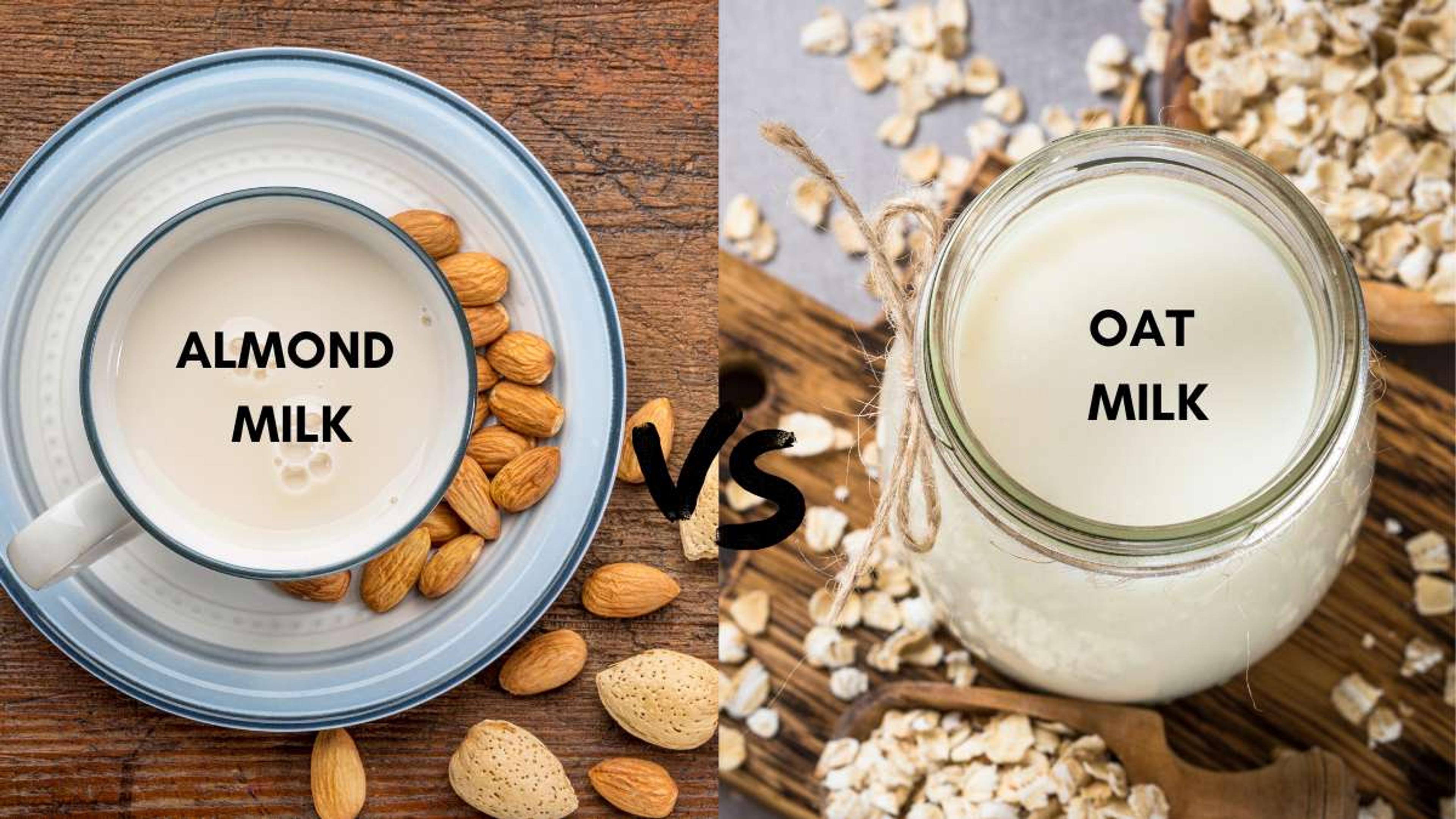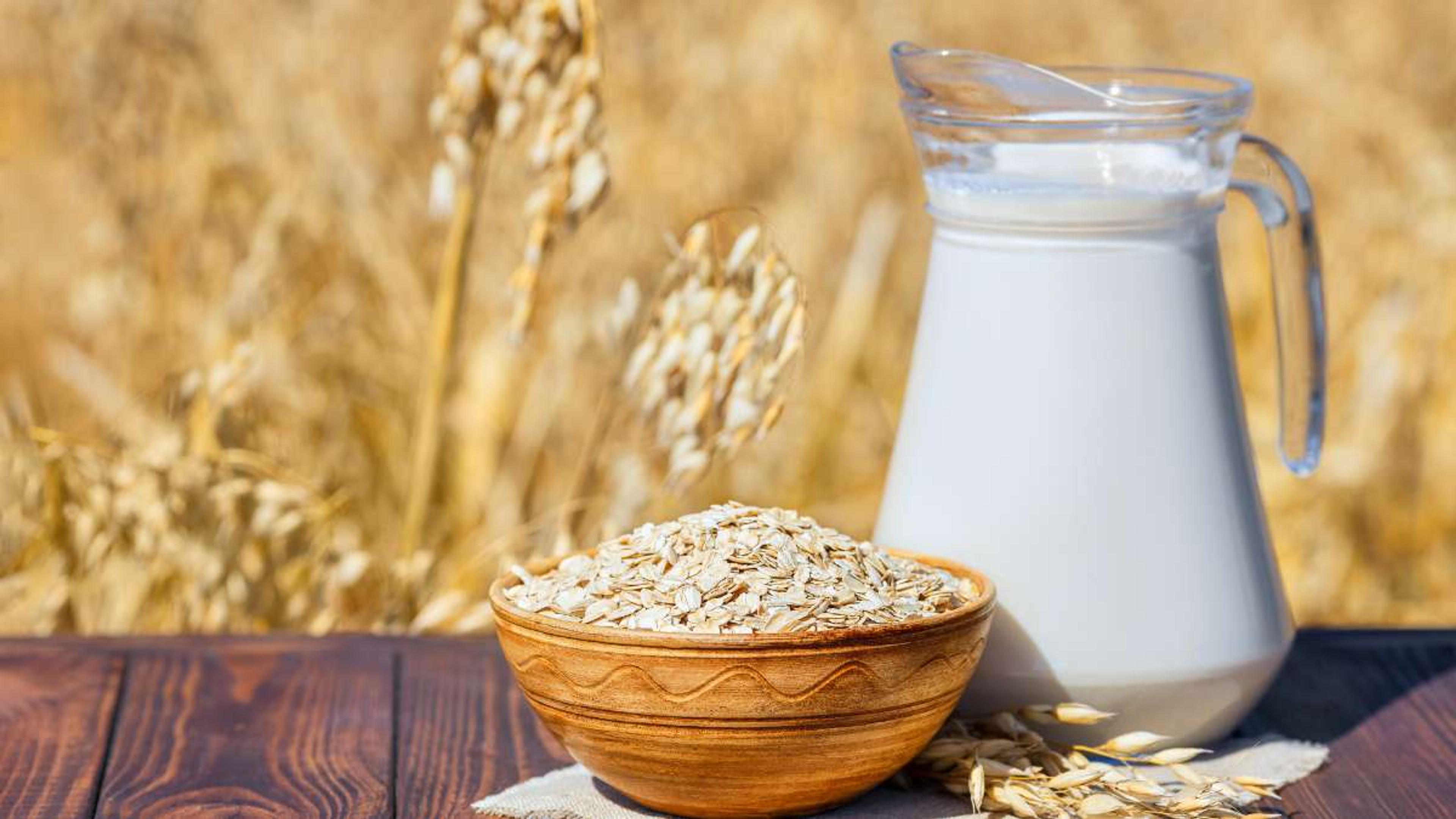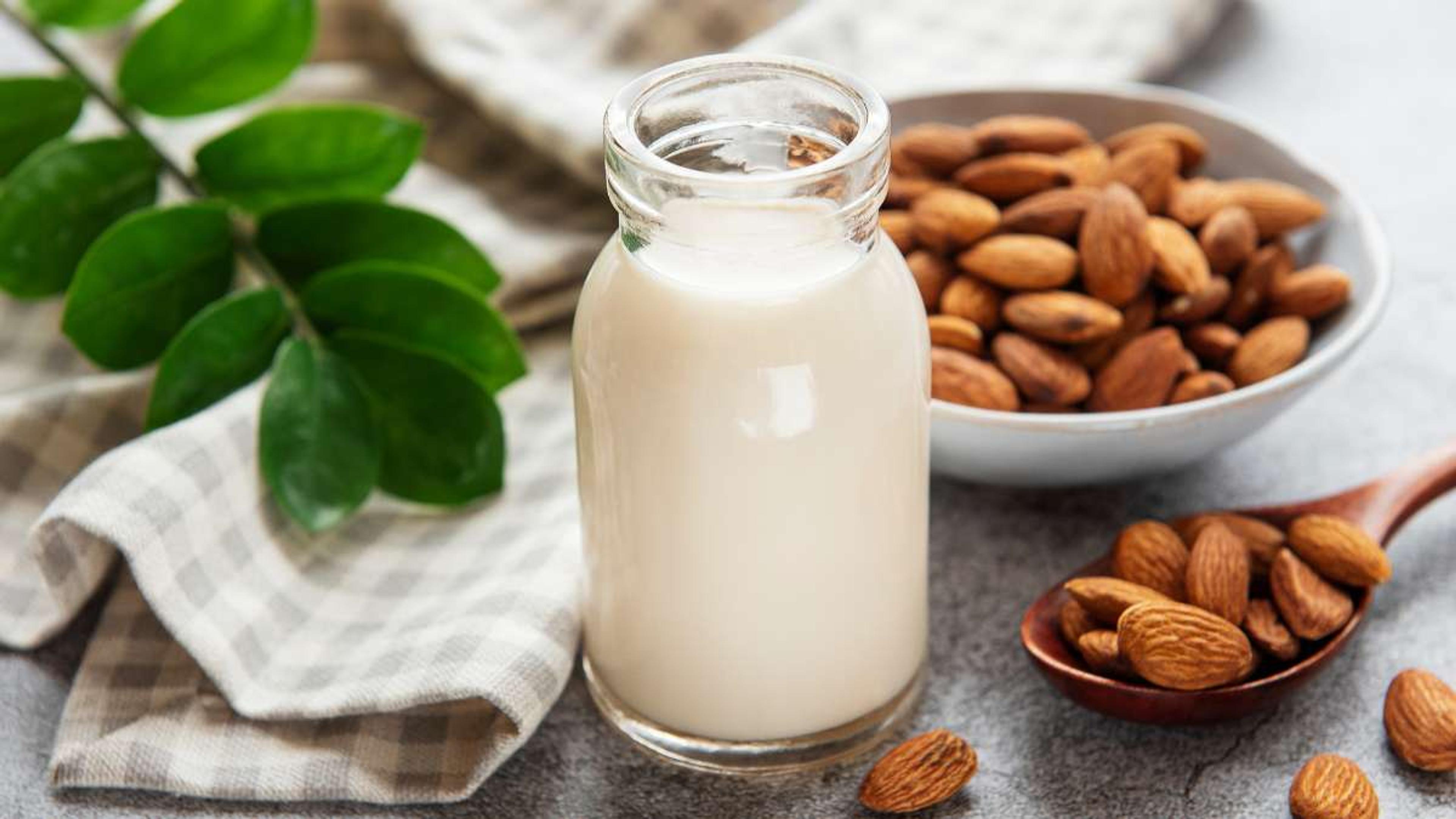Oat Milk vs Almond Milk: The Ultimate Comparison

- Key Takeaways
- Rise of Plant-Based Milk Alternatives
- Overview of the Nutritional Profiles
- Taste and Consistency
- Health Benefits of Oat Milk
- Health Benefits of Almond Milk
- Potential Concerns
- Production and Sustainability
- Making an Informed Choice
- Conclusion
- FAQs
Are you torn between oat milk and almond milk? Not sure which plant-based milk alternative to choose? Well, we've got you covered!
In this blog post, we'll provide a nutritional comparison of oat milk and almond milk, highlight their health benefits, discuss taste and consistency differences, address potential concerns, explore production and sustainability factors, and help you make an informed choice.
So get ready to discover the pros and cons of these popular dairy alternatives!
Key Takeaways
- Oat milk and almond milk are popular plant-based alternatives to cow's milk, with oat milk having more fat, protein, calories, and carbs compared to almond milk.
- Almond milk is lower in calories and carbohydrates than oat milk, making it a better choice for those watching their calorie intake or managing blood sugar levels.
- Both oat milk and almond milk offer health benefits such as potential cholesterol - lowering effects and being suitable for those with nut allergies. Oat milk is high in fiber while almond milk is a good source of vitamin E.
- Oat milk has a creamy taste and consistency, making it ideal for coffee drinks. Almond milk has a nutty flavor and thinner consistency that works well in lighter beverages like smoothies or baking recipes.
Rise of Plant-Based Milk Alternatives
Plant-based milk is on the rise. More people drink these milks than ever before. The sales of plant-based milk have gone up each year. Almond milk sells the most. These non-dairy milks are known as functional drinks because they can be good for your health.
Oat milk and almond milk are now loved by many people. More and more people want to eat plant-based food or can't have lactose, so they drink these milks instead of cow's milk. They use oat milk or almond milk in things like smoothies, cakes, and coffee drinks.
People around the world have used types of plant milk for a long time now. Today, there is much research on plant-based milks and their benefits.
Overview of the Nutritional Profiles
Oat milk and almond milk have different nutritional profiles, with variations in calorie content, carbohydrates, fat, and protein.
Nutritional Comparison
When comparing the nutritional values of oat milk and almond milk, there are a few key differences to note. The following table outlines some of these variances:
Oat Milk (Per 100ml)
- Calorie Content: Higher calorie count, making it more energy-dense than its counterpart.
- Carbohydrate Content: Boasts a higher carbohydrate content, which can provide energy for physical activities.
- Fat Content: Is relatively high, but it's mostly unsaturated fats, which are beneficial for cardiovascular health.
- Protein Content: provides more protein compared to almond milk, making it a good option for vegetarians or vegans seeking additional protein sources.
Almond Milk (Per 100ml)
- Calorie Content: Contains fewer calories, making it suitable for people looking to maintain or lose weight.
- Carbohydrate Content: Has fewer carbohydrates, which might be beneficial for those on low-carb diets.
- Fat Content: Contains comparable levels of fat, mostly monounsaturated fats, also known for their heart-healthy benefits.
- Protein Content: provides less protein, it still contributes to meeting daily protein needs.
These differences underline the importance of selecting a milk alternative that aligns with your dietary needs and preferences.
Taste and Consistency
Oat milk and almond milk have distinct flavors and textures that can vary depending on personal preference.
Oat Milk
- Flavour: Creamy, nutty and slightly sweet. The richness of its taste makes it a preferred choice for certain beverages like coffee.
- Texture & Consistency: Oat milk has a smooth, buttery texture, similar to full-fat dairy milk.
- Creaminess & Smoothness: Known for its creamier & smooth texture.
- Versatility: has a starchy taste that some people describe as oaty or biscuit-like. Oat milk has a creamy texture that works well in baking and cooking. It can be used as a substitute for regular milk in pancakes, muffins, and even creamy soups.
Almond Milk
- Flavour: Distinct nutty flavor. It's subtly sweet and light, has a slightly earthy taste.
- Texture & Consistency: Almond milk is thinner in consistency.
- Creaminess & Smoothness: not as creamy as oat milk, it's light, refreshing and smoother.
- Versatility: Almond milk blends smoothly into recipes, creating a silky consistency. It is great for making smoothies, lattes, or adding to coffee drinks.
Whether you're looking to make dairy-free desserts or enjoy your morning coffee without cow's milk, both oat milk and almond milk offer flexibility in the kitchen.
Health Benefits of Oat Milk
Oat milk offers various health benefits due to its high fiber content and potential cholesterol-lowering effects.

1. High in fiber
Oat milk is a great choice if you're looking for a plant-based milk alternative that is high in fiber. Fiber is important for our digestive health and can help regulate our bowel movements.
Oat milk contains about 2 grams of fiber per cup, which is significantly higher than almond milk. The fiber in oat milk contributes to its health benefits and can keep us feeling fuller for longer.
So, if you're looking to increase your fiber intake, oat milk may be the better option for you compared to almond milk.
2. Cholesterol-lowering effects
Oat milk and almond milk both have potential cholesterol-lowering effects, making them a great choice for those looking to improve their heart health. Oat milk contains high levels of dietary fiber, which can help reduce LDL (bad) cholesterol levels in the body.
Regular consumption of oats has been shown to contribute to lower cholesterol levels overall. On the other hand, almond milk contains polyunsaturated fatty acidsthat can also help lower LDL cholesterol and maintain cell health.
Both plant-based milks have been associated with positive impacts on cardiovascular health and are free from saturated fats and cholesterol found in regular dairy milk.
3. Suitable for those with nut allergies
Oat milk is a great option for people with nut allergies. Unlike almond milk, oat milk is both nut-free and dairy-free, making it a safe choice for those who need to avoid nuts. Oat milk does not contain saturated fat, which can be a concern for heart health.
However, it's important to note that some individuals may still have allergies or sensitivities to oats, so it's always important to monitor for any adverse reactionswhen trying new foods or beverages.
Health Benefits of Almond Milk
Almond milk is lower in calories and carbohydrates compared to oat milk, making it a suitable option for those looking to reduce their calorie intake or manage their blood sugar levels.

1. Lower in Calories and Carbohydrates
One important difference between oat milk and almond milk is that almond milk is lower in calories and carbohydrates. This means that if you're watching your calorie intake or trying to manage your blood sugar levels, almond milk may be a better option for you.
A serving of unsweetened almond milk contains only 37 calories and 1 gram of carbohydrates, making it a low-calorie and low-carb choice. In comparison, oat milk typically has more calories and carbohydrates.
So if you're looking for a lighter alternative, almond milk might be the way to go.
2. Good source of Vitamin E
Almond milk is a great choice if you're looking to increase your intake of vitamin E. This important nutrient is known for its benefits to the skin and immune system. Almond milk naturally contains higher amounts of vitamin E compared to oat milk, making it an ideal option for those seeking this particular health benefit.
Additionally, fortified almond milk can provide even more vitamin E along with other vitamins and calcium. So if boosting your immune response and promoting healthier skin are priorities for you, consider adding almond milk to your diet.
3. Heart Health Benefits
Oat milk and almond milk both offer potential heart health benefits. Almond milk is recommended by cardiologists for heart patients because it has properties that are good for the heart.
Both oat milk and almond milk have positive impacts on cardiovascular health, and they can be part of a heart-healthy diet. Oat milk is high in fiber, which has been linked to lower cholesterol levels, while almond milk is higher in healthy fats and fat-soluble vitamins like vitamin E.
These factors make both options beneficial for maintaining a healthy heart.
Potential Concerns
Additives and Sugar Content
- Some commercially manufactured brands of oat milk may contain high amounts of added sugar, which can be a concern for those trying to limit their sugar intake. It is important to carefully read the labels and choose unsweetened or low-sugar varieties if you are concerned about your sugar consumption.
- Additionally, some milk products may also contain additives such as thickeners or stabilizers that are non-vegan or non-vegetarian. These include cane sugar and thickeners such as gelatine. While these additives are generally recognized as safe by regulatory agencies, individuals with specific dietary restrictions or sensitivities may want to check the ingredient list before consuming.
- It's always a good idea to opt for milk that has minimal ingredients and is free from unnecessary additives whenever possible.
- So reading labels is key when choosing any plant-based milk alternative.
Health Concerns of Both
When considering oat milk and almond milk as alternatives to dairy milk, it's important to be aware of their potential drawbacks.
- Firstly, oat milk often contains added oils like canola oil, which may have inflammatory effects on the body.
- Additionally, some brands and flavors of oat milk may contain added sugar, leading to higher levels of sweetness in the product.
- On the other hand, almond milk may not naturally provide the same amount of calcium and protein found in dairy milk.
While both options have their benefits, it's essential to carefully read labels to ensure that you are making an informed choice based on your personal dietary needs and preferences.
Production and Sustainability
Almond milk production requires significantly more land and water compared to oat milk, contributing to a larger carbon footprint and increased packaging waste.

Water consumption
When it comes to almond versus oat farming, both have different demands in terms of land and water utilization. Almond milk production requires a lot of water, with each almond needing 12 liters. This puts a strain on water resources, especially in areas like California where almonds are primarily grown. The water-intensive nature of almond milk production has raised concerns about its sustainability. In contrast, oat milk production is less resource-intensive, requiring significantly less water and land. Oats are also known to be more resilient and can be grown in various climates.
Land Usage
The production of almond milk requires less land compared to oat farming. However, it's important to note that almond milk production still contributes to deforestation and the depletion of natural habitats for wildlife. In contrast, oat farming requires more land but does not have the same detrimental effects on ecosystems.
Carbon footprint
Oat milk has a lower carbon footprint compared to almond milk. In fact, oat milk claims to produce 86% fewer greenhouse gas emissions than almond milk. This means that choosing oat milk over almond milk can significantly reduce your impact on the environment.
For example, a small glass of oat milk is responsible for approximately 0.18kg of CO2e, which is much lower than the emissions associated with cow's milk as well. Overall, when it comes to reducing your carbon footprint, oat milk is a more environmentally friendly choice compared to almond milk or traditional dairy options.
Packaging waste
Oat milk and almond milk both contribute to packaging waste. When we buy these plant-based milk alternatives, they typically come in cartons or bottles that need to be discarded. However, the specific amount of packaging waste associated with oat milk and almond milk is not mentioned.
It's important to consider the environmental impact of packaging waste when comparing these options for sustainability purposes. While it's difficult to directly compare the two in terms of their packaging waste, it is still an aspect worth considering when making a choice between oat milk and almond milk.
Making an Informed Choice
Consider your dietary preferences, nutritional needs, and personal taste when choosing between oat milk and almond milk. Read labels to check for added sugars, fortifications, and other ingredients that may affect your health.
Choose the milk alternative that aligns with your values and supports your overall well-being.
Factors to consider when choosing between oat milk and almond milk
When choosing between oat milk and almond milk, there are several factors to consider. These include:
- Nutritional needs: Consider your dietary requirements and goals. If you need more calcium, almond milk may be a better choice due to its higher calcium content.
- Taste preference: Try both oat milk and almond milk to determine which flavor profile you prefer. Oat milk has a slightly sweet taste, while almond milk has a nutty flavor.
- Allergies or sensitivities: If you have a nut allergy or sensitivity, oat milk is a suitable alternative as it is nut-free.
- Sustainability: Take into account the environmental impact of production. Oat milk requires less water compared to almond milk, making it a more sustainable option.
- Versatility in recipes: Consider how you plan to use the milk alternative. Oat milk's creamy texture makes it great for baking and coffee drinks, while almond milk is often used in smoothies and as a dairy substitute.
- Personal preference: Ultimately, choose the option that aligns with your personal taste preferences and dietary needs.
Reading Labels for Added Sugars
Reading labels is important to make an informed choice between oat milk and almond milk. Here are some things to look for:
- Check for added sugars: Look for words like cane sugar, corn syrup, or any other sweeteners in the ingredient list. Opt for unsweetened varieties to avoid excessive sugar intake & check for vegan sugars.
- Fortifications: Some oat and almond milks may be fortified with additional nutrients like calcium, vitamin D, or vitamin B12. Consider your nutritional needs and choose a milk that aligns with them.
- Other ingredients: Look out for additives like carrageenan, which can cause digestive issues in some individuals. Choose milks without unnecessary thickeners or additives if you prefer a simpler ingredient list.
Conclusion
In conclusion, understanding the nutritional differences and health benefits of oat milk and almond milk can help individuals make more informed choices based on their dietary preferences and needs.
So, if you're curious to learn more about these popular plant-based milk alternatives, keep reading!
FAQs
1. What is the big deal about oat milk and almond milk?
Oat milk and almond milk are popular plant-based milk options that people use as an alternative to cow's milk.
2. Are oat milk and almond milk gluten-free?
Yes, both oat and almond milks are usually free from gluten but watch out for cross-contamination in some brands like Oatly.
3. How does the protein in oat milk compare to almond milk?
A regular cup of unsweetened almond milk has about one gram of protein while a cup of oathas about four grams of protein.
4. Which is better: Oat Milk or Almond Milk?
The best option between the two differs based on what you're looking for nutrition-wise. Almond uses less water than oats (only gallons compared to oats) but oats can offer more micronutrients like phosphorus and potassium.
5. Can I drink these milks if I want to avoid animal products?
Absolutely! Both soy, almond, and other alternative milks do not contain any animal products.

